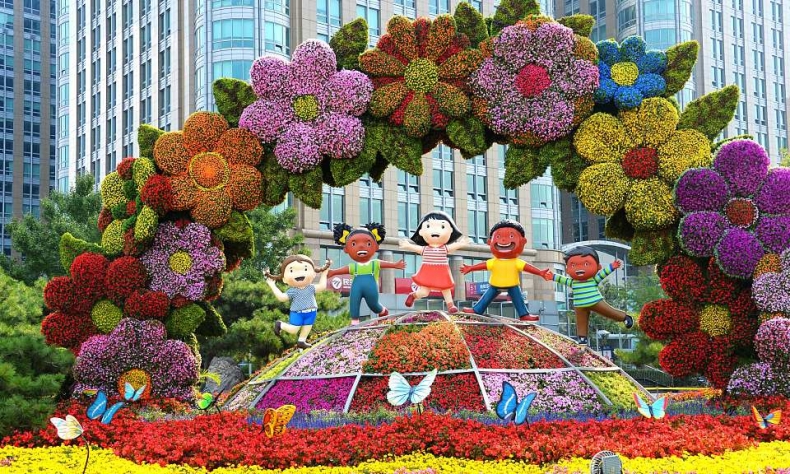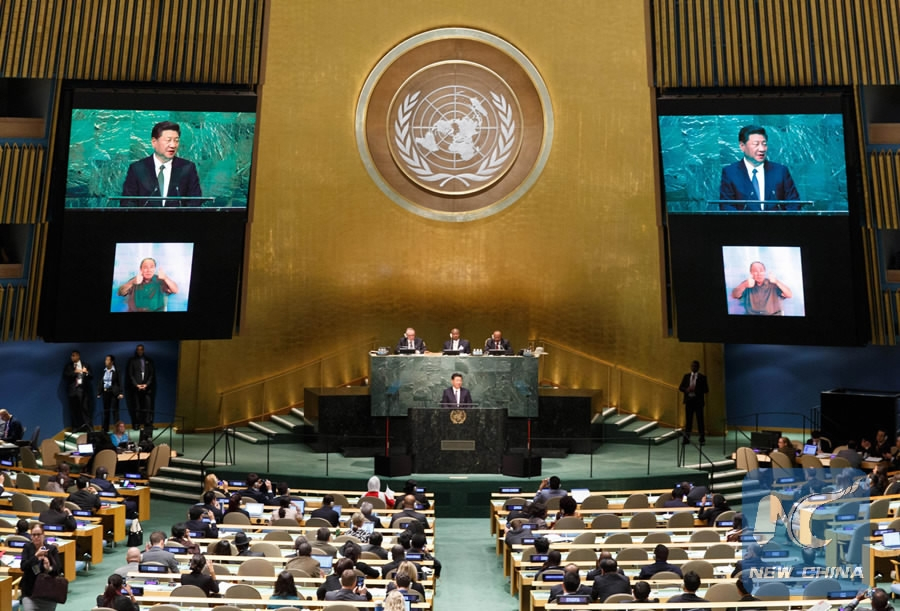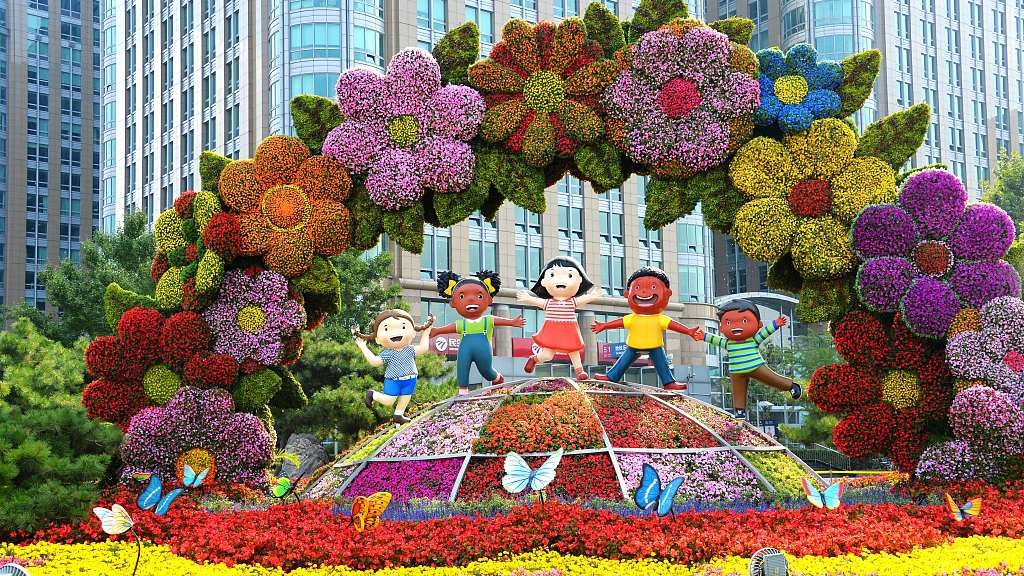
All Players Must Rise above Differences for a Prosperous Global Village
In short, the UN shoulders the aspirations of the world for a better future. It has done a good job contributing to peace and development of the world, and deserves a big thumbs-up.
Seventy-five years ago, our fathers’ generation won the epic victory of the World Anti-Fascist War through years of heroic struggles. The ensuing decades witnessed the founding of the United Nations on October 24, 1945, the best hope of humankind to facilitate international cooperation and coordination and establish a new international order to avoid a third world war following two such cataclysms.
From organizing peacekeeping missions to implementing the Millennium Development Goals and then the Sustainable Development Goals, from promoting South-South and North-South cooperation to implementing its Development Program, World Food Program and Environment Program, and from offering humanitarian and development assistance to children and mothers through its Children’s Fund to recognizing World Heritage Sites by its Educational, Scientific and Cultural Organization, the UN has been the guardian of international peace and security, the promoter of human progress, the protector of international law, and the engineer of socioeconomic development.
Over the past 75 years, the ideals, values and objectives of the UN have been endured: the peaceful settlement of disputes; the equal rights of men and women; non-intervention, self-determination and the sovereign equality of member states; and the clear rules governing the use of force. The purposes and principles of the UN have formed the bedrock of international relations, and remained the touchstone we all refer to and rely upon to uphold our shared responsibilities and achieve our global commitments.
In short, the UN shoulders the aspirations of the world for a better future. It has done a good job contributing to peace and development of the world, and deserves a big thumbs-up.
Practitioner of multilateralism
In the 2015 summit meetings commemorating the 70th anniversary of the UN, President Xi Jinping announced a host of important initiatives and measures in support of the work of the UN. All of them have been delivered on the ground.
China is now the second largest contributor to the UN’s regular budget and peacekeeping assessment, the largest contributor of peacekeepers among the five Permanent UN Security Council members. China has registered a standby force of 8,000 troops and a police squad of 300 troops for UN peacekeeping missions, and elevated six of its standby contingents to Level Three in the four-level UN Peacekeeping Capability Readiness System. As such, China now has the biggest standby force and most varieties of contingents among all UN member states.
The China-UN Peace and Development Fund has provided a total funding of $67.7 million to over 80 projects. These projects have facilitated the UN’s efforts in different areas like peacekeeping, counter-terrorism, energy, agriculture, infrastructure and education.
China has assisted other developing countries with 180 poverty reduction projects, 118 agricultural cooperation projects, 178 trade facilitation projects, 103 projects on ecological conservation and climate change, 134 hospitals and clinics and 123 educational and vocational training institutes. The South-South Cooperation Assistance Fund has supported over 80 projects in more than 30 developing countries, injecting impetus for global sustainable development.
China has donated $10 million to UN Women, making it the largest contributor among developing countries. China has completed 133 health projects for women and children and invited over 30,000 women from developing countries for training programs. By doing so, China has made an important contribution to women’s development in the world.
To promote international cooperation against the novel coronavirus disease (COVID-19), China has launched the biggest global humanitarian operation in its history. It has provided assistance to over 150 countries and international organizations and ensured stable global production and supply of anti-epidemic materials. COVID-19 vaccine development and deployment in China, when available, will be made a global public good. This will be China’s contribution to ensuring vaccine accessibility and affordability in developing countries. Also, China has joined COVAX, an international initiative aimed at ensuring equitable global access to COVID-19 vaccines, becoming the largest economy to support the initiative so far.
A community with a shared future
In celebration of the 75th anniversary of the UN, the essence of the current international situation is that each and every country’s future is closely linked. We must, as President Xi put it at the General Debate of the 75th Session of the UN General Assembly on September 22, rise above ideological disputes, preserve the environment and make Mother Earth a better place for all.
In the global fight against COVID-19, the vision’s features have fully manifested themselves, and given insight to the future orientation of global cooperation in the UN:
A people-centered commitment. At a time of frequent humanitarian crises, building a community with a shared future for mankind calls for delivering care and hope to people in dire situations, and protecting women, children, the elderly, the physically challenged and other vulnerable groups with humanity, charity and dedication. The world shall stay committed to putting the life of the people front and center, uphold humanitarianism and take effective measures to stem the global spread of COVID-19.
A multi-pronged and coordinated approach. A community with a shared future for humanity is a multi-dimensional concept that covers politics, security, development, civilization, ecology and all other fields. Having taken a toll on the world economy, global governance, social development and public health, COVID-19 has created multiple crises and requires a multi-pronged response. Guided by the vision of building a community with a shared future for humanity, we need to conduct international cooperation against the virus at bilateral, regional and global levels, and take targeted measures in healthcare, economic growth, people’s livelihoods and national governance. We need to seek parallel progress in epidemic control, economic and social development, domestic response and global public health governance.
An unwavering belief in science. A community with a shared future for mankind prioritizes concrete practices, follows scientific thinking and embodies the philosophy of dialectical materialism and historical materialism. The unexpected and ferocious virus will exploit loopholes if science is ignored. Guided by the vision, we must base our conclusion on facts. We must not allow politics to trump science and reason. We must not let the politicization of COVID-19 distract from science-based prevention, control, treatment and research. The global narrative about COVID-19 should reflect reason and conscience. History should be written with facts, not tainted by lies. We have an obligation to leave behind an objective and truthful account as part of our own collective memory.
The UN has an irreplaceable role to play in forging a community with a shared future for humanity. It should instill the sense that we all live in the same community and therefore should work together in solidarity and look out for one another in tackling risks and challenges. It should promote partnerships at the regional and global levels and envision a common goal of building an open, inclusive, clean and beautiful world that enjoys lasting peace, universal security and common prosperity.
Looking ahead, the world needs a stronger UN to meet challenges and turn crises into opportunities. A stronger UN that regenerates its capacity for mobilizing global cooperation, and adjusts to new situations and reshapes the zeitgeist of our time. A stronger UN that safeguards world peace and security, champions common development, safeguards the international order, supports greater democracy in international relations, advocates harmonious coexistence across different races, systems and cultures, calls for solidarity and cooperation, and keeps abreast of the times and responds to global challenges.
A stronger UN underlines the need to reform, especially in the three critical areas of peace and security, economic development and internal management. The UN reform should be led by member states, prioritize concerns of developing countries, and aim at a more efficient UN with enhanced oversight and accountability to reach its full potential.
Multilateralism or unilateralism
The differences and contradictions between China and the United States are not a struggle for power, status, or social system, but the persistence of multilateralism or unilateralism, and the advocacy of win-win cooperation or zero-sum game.
The current China-U.S. relationship has become a source of concern for many in the international community. The fundamental reason for this is that some extreme hawkish politicians in the U.S., driven by the need to lift campaign prospects and maintain unipolar hegemony, are going all out to negate the history of China-U.S. relations and suppress China on every front, instigating renewed ideological confrontation and misleading the world into “a new cold war.”
The U.S. is the absolute solo maker of these regressive moves, which is against the willingness and aspiration of China and the whole world. The reckless provocation of confrontation and division is out of touch with the reality of the intertwined and integrated interests between China and the U.S.
In the era of globalization, it is impossible to divide the world into two or three camps again, for all countries have been interwoven with each other and become a community with a shared future. Should such conspiracy theories be allowed to have their way, not only will China-U.S. relations fall into the abyss of confrontation, but the entire humankind’s future will be dragged into peril.
Fundamentally speaking, the U.S. has made a strategic mistake by taking China as its adversary, for China is not the Soviet Union. It has no interest in replacing America, nor is it interested to be “America the second.”
The reason is crystal clear: China is committed to development. Its aim is to bring happiness and wellbeing to the Chinese people, and peace and development to the world. It does not seek to export its system or model of development, nor is it intended to engage in ideological confrontation.
In response to the U.S. words and actions that undermine China’s core and major interests, China has taken, and will continue to take, firm and necessary countermeasures. It will never allow a few anti-China elements to overturn decades of successful exchanges and cooperation between China and the U.S., nor will it allow ideological prejudice to undermine the future development of China-U.S. relations. The Chinese side must clarify the facts and make necessary responses.
In the meantime, the door to China-U.S. dialogue is open. China is ready to have a candid and in-depth exchange of views with the U.S. side on issues of common concern at any time and through equal communication and exchanges.
As President Xi put it at the General Debate of the 75th Session of the UN General Assembly, “It is natural for countries to have differences. What’s important is to address them through dialogue and consultation.”
In a world fraught with challenges and mounting risks, if the UN is to survive and prosper, those who represent it must bolster it, those who advocate it must submit to it, and those who believe in it must fight for it.
China will continue to stay on the right side of history and human progress.
The author is Counselor of the Ministry of Foreign Affairs, China.
 Facebook
Facebook
 Twitter
Twitter
 Linkedin
Linkedin
 Google +
Google +











